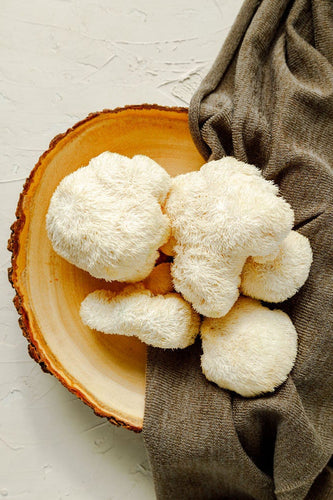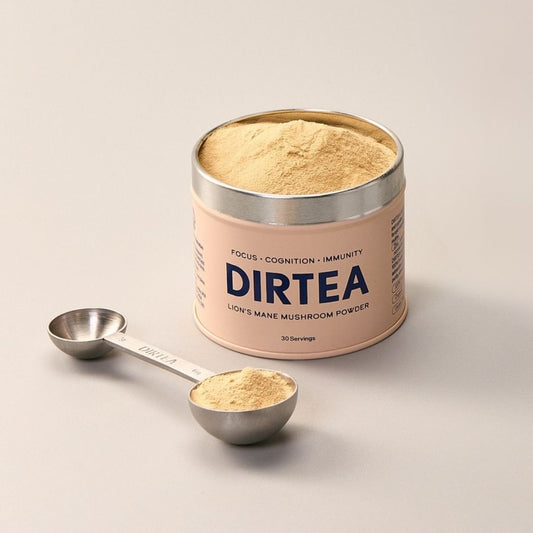Lion's Mane Mushroom: The Brain Boosting Fungi

Share
INTRODUCTION TO LION’S MANE
Lion’s Mane mushroom (Hericium erinaceus) looks like a white ball covered in shaggy spines. It is a functional mushroom, meaning that it has health benefits beyond its nutritional value, increasingly supported and backed by scientific studies. Due to its brain neurotrophic benefits, it is known to many, as the ‘smart mushroom’. So if you feel your brain deserves more power and focus plus a few extra added brain cells, keep reading.

HISTORY OF LION’S MANE
Lion’s Mane has been a part of East Asian cultures and has been used in traditional Chinese medicine for centuries. In Chinese it is known as hóu tóu gū (“monkey head mushroom”) and in Japanese, yamabushitake (“mountain monk mushroom”). Once known as the “Mountain Priest”, Lion's Mane was reserved for royalty and cherished by Buddhist monks. Lion’s Mane was traditionally used to fortify the spleen and nourish the gut (our second brain). Shaolin Buddhist monks took powdered Lion’s mane on account of its cognitive powers and ability to enhance deep meditation practice.
WHY IS LION’S MANE SO GOOD FOR OUR BRAIN?
One of the most notable benefits of Lion’s Mane is its ability to stimulate the production of Nerve Growth Factor (NGF).(1) NGF is a protein that has the ability to stimulate the growth of new brain cells in the hippocampus, which is associated with thinking, learning and emotions (it also looks like a sea horse!). It’s basically like taking your brain to the gym and giving it a good workout to keep it healthy and strong. But still, the benefits continue beyond the brain. Get your notepads out, as there are some gems we’re about to drop - your body will thank you for being introduced to the smartest mushroom!
LION’S MANE’S HEALING PROPERTIES
As much as we don’t want to hear it, our brain health naturally declines over time. We all age. However, we can reduce symptoms of ageing when we take care of our brains. NGF is a protein that plays a crucial role in the growth and survival of nerve cells in the brain. NGF is important in the maintenance and development of neurons, a process known as neurogenesis. London Taxi Drivers provide a good example of the power of neurogenesis. Scans reveal the structure of their brain changes during the gruelling process of learning the quickest way around the capital, indicating that the brain could adapt to new tasks, even in adulthood.(2) Like cognitive exercises, Lion’s Mane can stimulate production of NFG and promote neurogenesis.(3) What would happen if one took Lion’s Mane to aid in the process of learning a new skill or honing in on a task?
IMPROVED FOCUS
Do you ever wake up in the morning with brain fog or have days when it’s hard to focus? Perhaps Lion’s Mane can help.
The takeaway here? We are all searching for that quick-fix pill. However, consistency is key. In the words of the famous leadership coach John Maxwell, “Small disciplines repeated with consistency every day lead to great achievements gained slowly over time.”
LION’S MANE ENGAGES IN TWO BRAINS, THE BRAIN AND THE GUT
Remember how we talk about the ‘gut’ feeling when things feel good or bad? That’s your other brain guiding you. Gut health is the foundation of a healthier life. Your gut is the site of much of your digestion and absorbs nutrients from the food you eat. Your gut bacteria manufacture 95% of your body's supply of serotonin, which is vital for not just boosting your mood, but regulating body temperature, hunger and sexual activity. Lion’s Mane contains prebiotics which feed the good bacteria in our guts. A rodent study showed that the probiotics increased rapidly within six hours of administering Lion’s mane.(4)
HOW TO TAKE:
Lion’s Mane can be consumed in many forms, including powder extract, dietary supplements or whole mushrooms. For those who have yet to try it, our DIRTEA Lion’s Mane powder has a mild flavour that’s a bit like miso soup and when the whole mushroom is cooked it has a texture that is stringy/meaty, and it tastes mildly sweet. It can be cooked and added to various dishes.
KEY TAKEAWAYS
1. Boosts cognitive function
2. Provides focus and mental clarity
3. Stimulates the production of Nerve Growth Factor, which is vital for the development and survival of nerve cells
4. Great for digestion
REFERENCES
- Kawagishi, H., Shimada, A., Hosokawa,S., Mori, H., Sakamoto,H., Ishiguro,Y., Sakemi, S., Bordner, J., Kojima, N.,and Furukawa, S., (1996). ‘Erinacines E, F, and G, Stimulators of Nerve Growth Factor (NGF).Synthesis, from the Mycelia of Hericium erinaceum’, Tetrahedron Letters, 37(41), pp. 7399-7402
- Woollett, K.,and Maguire, E. A., (2011). ‘Acquiring “the Knowledge” of London's Layout Drives Structural Brain Changes’, Current Biology. 21(24-2), pp. 2109–2114. doi: 1016/j.cub.2011.11.018
- Li, I.-C., Chang, H.-H., Lin, C.-C., Chen, W.-P., Lu, T.H., Lee, L.-Y., Chen, Y.-W., Chen, Y.-P., Chen, C.C., and Lin, D.P.-C., (2020). ‘Prevention of Early Alzheimer’s Disease byu Erinacine A- Enriched Hericium erinaceus Mycelia Pilot Double- Blind Placebo- Controlled Study’, Frontiers in Aging Neuroscience. 12 (155). doi: 10.3389/fnagi.2020.00155
- Yang, Y., Zhao, C., Diao, M., Zhong, S., Sun, M., Sun,B., Ye,H., and Zhang, T., (2018). ‘The Prebiotic Activity of Simulated Gastric and Intestinal Digesta of Polysaccharides from the Hericium erinaceus’, 23(12), pp.3158. doi: 10.3390/molecules23123158







